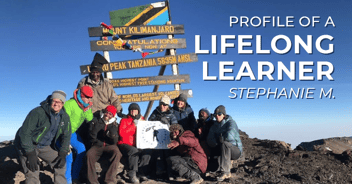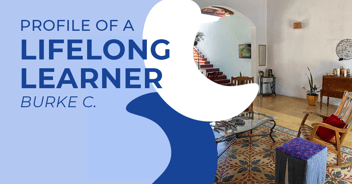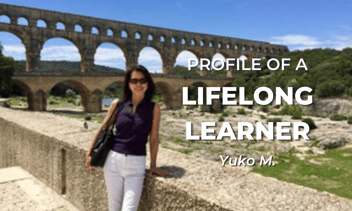Profile of a Lifelong Learner: Aaron T.
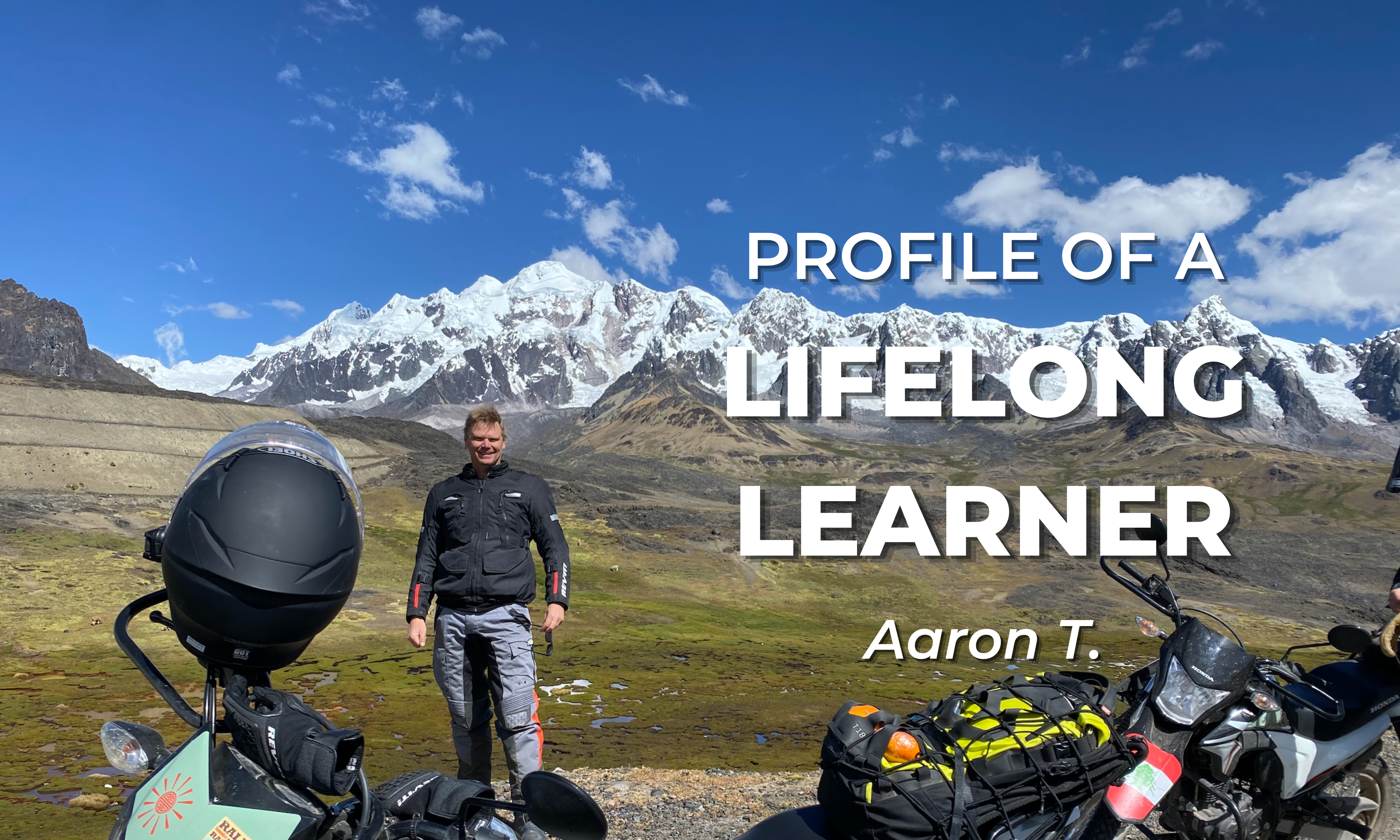
Here at ICLS, we believe that lifelong learning and travel are powerful ways to build relationships and make authentic human connections. So we were so excited when Aaron sat down with us and shared his story of love, travel, and language. From Mexico, and Peru to the U.S. and back again, Aaron has invested himself in the adventure of learning Spanish and it changed the course of his life. If you are ready to get started on your journey, check out our language classes for mature adults.
Around the world on a motorcycle
When he was in his early 20s, Aaron came across Ted Simon’s book Jupiters Travels: Four Years Around the World on a Triumph. After meeting the author at a motorcycle convention in Texas, he became inspired to do the same. His road trip started in Mexico, where his journey with language also began. 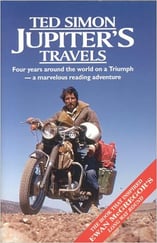
After a successful pilot trip, he set off for San Miguel, Central Mexico, where he enrolled in a language school and lived with a local family. Despite his eagerness to immerse himself in Spanish, learning in a school setting wasn’t a great fit for him. As he explained, “I never was much for sitting in classrooms; I would get antsy.” It didn’t help that the school’s approach to language learning was not particularly interactive or engaging.
Soon, Aaron left the language school behind and went to live with a friend he’d just met. San Miguel being a popular destination for American expats, Aaron was able to get by with minimal Spanish. When he left the town, however, things got real:
“In rural areas, even in the big cities, people didn’t speak English at all; it started to matter; I started to understand that if I was going to learn, I was going to have to focus on it.”
A friend of his had recommended the book “500 Spanish verbs”. Aaron opted for the travel-friendly 300 verbs version and started flipping through the pages, looking for phrases and sentences that could be useful to him based on what he was doing that day.
“I started picking verbs, and I learned to conjugate them in the past, present, and future tense. I would adapt the sample sentences and the verbs to form new sentences that I needed to ask. Like, “How far away is this?” Or “Where is a good hotel?”.”
The role of humor in language learning
Aaron sometimes made fun of himself by exaggerating his own American accent. Not only did this help break the ice when meeting new people, but it also allowed him to contrast his pronunciation with theirs. Besides helping him grasp nuances of Spanish pronunciation, it earned him new friends who enjoyed his sense of humor.
“There are a lot of places to play with in the Spanish language, like rolling your r’s. And many English speakers can’t roll their r’s, or rather are scared to.”
As Aaron learned more about the intricacy of learning a new language, he quickly realized that it can be a very humbling experience that many new learners struggle with:
“Being willing to be vulnerable in front of strangers as you try to speak their language played a huge part in my learning. I am going say things and get corrected, and we’ll laugh about it, and I’ll learn.”
Aaron’s journey continued to Guatemala. He admits that he would frequently gravitate towards touristy towns that featured English as a common language.
As he traveled through Latin America, he became aware of the cultural and linguistic diversity that permeates the Spanish-speaking world. For example, in many parts of Peru, people speak Quechua, while others speak both Quechua and Spanish, and some only Spanish. He also encountered pockets of Chinese communities who spoke Spanish with an accent different from his but with whom he was able to communicate because of their common language.
Settling in Peru
Seven months and many adventures later, Aaron reached Northern Peru. It was the summer of 1998, and the area was experiencing historical floods. He rode on makeshift bridges and often crossed bodies of water with the help of locals with whom he had to communicate in Spanish.
By the time he reached Barranca, his motorcycle transmission gave up. He fortuitously ran into two police officers who took a break from giving speeding tickets and started flagging down every truck that was going by, trying to find somebody who was going to Lima. It took two hours, but finally, somebody stopped and agreed to take him to his destination.
Aaron decided to spend some time in Peru, hanging out in one of the first microbreweries in the country, dancing in clubs at night, and making new friends along the way.
None of Aaron’s new friends spoke English, which only pushed him to improve his Spanish even more. Reflecting on his language learning journey, Aaron noted that
“You don’t have to be a master at a language to enjoy speaking it. It’s amazing how much connection, exchange, and beauty you can experience with a group with very limited language skills.”
Aaron continued to actively study Spanish, frequently referencing his 300 Spanish verbs, and trying out new tenses and structures to express increasingly complex thoughts.
After seven months in Latin America, he described his Spanish as fully functional. At that point, and for the following two months, he experienced an enormous gain in linguistic competency. He became fluent, reaching a point where people commented on his mastery of the Spanish language.
From proficient to fully fluent
Regardless of his tremendous growth with the language, there were still setbacks and moments of discouragement along the way.
“You get good at ordering food and any type of travel-related transaction, but then you get into a philosophical or political conversation, and you crash into a wall. And you think I can’t speak Spanish at all.”
The more Aaron immersed himself in the culture, the more fluent he became. His curiosity for the language itself skyrocketed, which only helped him improve more. For any new words he encountered, he would ask his friends to explain them to him in Spanish until it was no longer necessary to do so.
“At some point, it just started to click and flow, and I started building up on the foundation I had and figuring things out. I no longer needed a book or somebody else to explain words to me.”
Nine months into his trip, Aaron fell in love, got married, and started a family. This milestone also contributed to his language development, as being in a relationship requires a different set of linguistic skills, such as the ability to communicate complex emotions and feelings. Through his relationship with his wife, he was able to grasp another dimension of the language.
After a brief stay back in the US, Aaron and his wife moved back to Peru, where they started an import and export business. This new endeavor required that Aaron master business Spanish in order to manage, at times, large business transactions.
Home sweet home
Ultimately, Aaron and his family relocated to Boulder, Colorado. Inevitably, over time, his Spanish proficiency began to decrease. His wife learned English, and although there were many Spanish speakers around him, Aaron’s proficiency was in Peruvian Spanish, while local Spanish speakers were primarily from Mexico and Central America, where the accent, slang, and cultural references are different.
“It’s been a painful process to watch my Spanish slip, although now when I go to a Spanish-speaking country, it comes back pretty quickly. But there are a lot of awkward moments of frustration.”
Aaron continues to go on frequent road trips in South America, where he experiences episodic “flowers of fluency,” learns dialectal variations of Spanish, and gets exposed to new accents.
His Spanish is not as fluent as it was when he was living in Peru, but it is still strong enough to allow him to communicate with people everywhere he goes. As he noted,
“Many Americans or even expats don’t learn the language of the countries they visit, but for me, knowing Spanish allows me to really connect with people on a deeper level, and it’s also a sign of respect for the culture.”
When asked about future plans, Aaron shared his wish to continue riding his bike in Mexico to meet new people, improve his Spanish, and maybe become fluent again.
Lifelong Learning at ICLS: Language classes for mature adults
Inspired to start your language-learning journey? Whether you’re looking to dip your toes into a new culture, prepare for an upcoming trip, or boost your professional skills, ICLS has a language class to help you become a lifelong learner! Our highly experienced, top-tier instructors will make sure you achieve your goals and have fun while doing so.
Our Lifelong Language Program offers 6-week online language classes for mature adults centered on travel and culture themes in French, Spanish, and Italian.
And if you’re looking for a more intensive experience, try our 10-week Online Group Language Courses. Choose between courses in Arabic, Chinese, French, Brazilian Portuguese, Russian, and Spanish.
